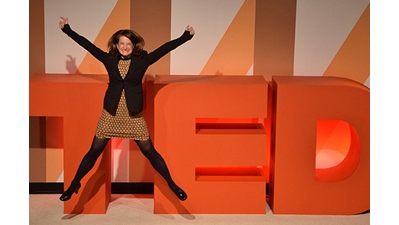Helping solve the kidney shortage was something that, Amy Waterman, Ph.D., an Associate Professor and national transplant educator, dreamed of doing when she was growing up in Knoxville, TN. But to do that, she needed to surround herself from as many smart and diverse people as she could. When she moved to Los Angeles in 2013 to work at UCLA, a friend told her that her favorite week of the year was when she attended the TED Conference in Vancouver, BC, in part because of all the creative and intelligent people that were gathered in one place.
“She told me that people who attended TED had a higher level of hope about the future and ability to make things happen,” Amy says. “And, then, she told me to apply.” A TED application consists of essays explaining leadership skills, the place of service in the applicant’s life, and recommendations from three peers. “It was kind of like applying for college,” says Amy, laughing. It took 3 months before the TED Committee gave her an answer. You can see how she felt when she got her acceptance to TED2016: Dream by taking another look at the photo above.
Amy also had to find a sponsorship to help cover the costs. “An amazing kidney patient thought what I was doing was important and offered to help,” Amy says. “She has been a cheerleader for me and my work, and I am very grateful she has made this possible.”
While she won’t be speaking at TED this time, Amy feels there is still potential in her upcoming trip to Canada. “I already know what the transplant field thinks about the shortage of kidneys. My goal is to talk to a lot of people who have solved other important problems and learn how I might harness novel strategies to help people live longer with transplants. I hope that more kidney patients may be alive in the future because of a conversation I have next week.”
She sees a particular possibility in learning how others have galvanized media – new and old, social and personal – in powerful ways. One TED speaker she wants to listen to, in particular, is Shonda Rhimes, the creator of Grey’s Anatomy and author of The Year of Yes. “There’s a journal article that shows that television showrunners like Shonda Rhimes are doing a better job at educating the public about living kidney donation through their medical shows than educators like me! I would love the chance to talk to her in person.”
Amy has spent the weeks leading up to TED getting acquainted with other attendees through a private Facebook group, meeting some locals who are going, and reading the books that TED sends attendees in advance. She already learned from the Facebook postings that another TED attendee is considering donating a kidney to her cousin. “I have packed Explore Transplant and Explore Living Donation education to share in my suitcase,” she says.
“When people hear that I am going to TED, they react like I am going to the Oscars,” Amy says. “However, I got to attend because I live a life of service that is big enough to get me there. My UCLA research team is holding down the fort so that I can come. My costs are covered, thanks to my benefactor. I am so grateful. I feel like I’m at the starting line and about to run the race!”
Next stop: Vancouver.

